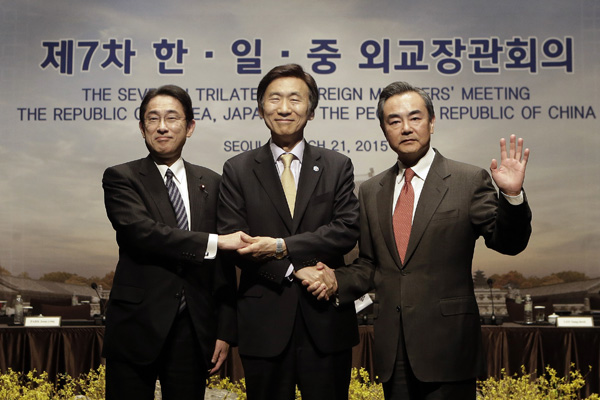
Foreign Minister Wang Yi (right) stands for a photo with South Korean Foreign Minister Yun Byung-se (center) and Japanese Foreign Minister Fumio Kishida during the 7th Trilateral Foreign Ministers' Meeting in Seoul, South Korea, on Saturday. AHN YOUNG-JOON/AGENCE FRANCE-PRESSE
Following a three-year hiatus, the Seventh Trilateral Foreign Minsters' Meeting, which included China, Japan and South Korea, was held on Saturday in Seoul.
Observers saw the renewal as evidence that Tokyo was attempting to ease strains with Beijing and Seoul over its World War II-era aggression, but expressed caution, saying that Japan needs to do more to convince its neighbors of its sincerity.
After the three sides agreed on the idea of "facing history squarely", Foreign Minister Wang Yi said at a joint news conference that cooperation is "back on the track of normalcy".
"In the spirit of facing history squarely and advancing toward the future, the three ministers agreed that the three countries should address related issues properly," a news release about the meeting said.
Japan is "taking one of the preliminary steps" toward an ultimate reconciliation of the history issue with the neighbors it victimized, experts said.
Yang Bojiang, deputy director of the Institute of Japan Studies at the Chinese Academy of Social Sciences, said the resumption of talks on Saturday is "another prominent indicator" of the further easing of strains after President Xi Jinping's brief meeting with Japanese Prime Minister Shinzo Abe in November.
Highlights of the meeting include decisions to accelerate the negotiation of a free-trade agreement.
Wei Ling, an expert on East Asian studies at China Foreign Affairs University, said "it is definitely natural" to see the trend of trilateral economic collaboration warming up once again because "the demand for them working together is quite remarkable".
Zhang Jingquan, a professor of Northeast Asia studies at Jilin University in Changchun, said the Saturday meeting "has actually struck a tone for how to address the 70th anniversary of the end of World War II".
After past foreign ministers' meetings, it was common to see a summit of the three leaders within a few months. Following that pattern, the three ministers said in Saturday's joint statement that they had decided to continue their efforts in a summit meeting "at the earliest convenient time for the three countries", though no date was set.
Abe is preparing a speech to be delivered on Aug 15 outlining Japan's official position on the war and the anniversary.
As the anniversary nears, China and South Korea are continuing to observe Japan's posture with respect to the war, Zhang said.
Wang told reporters on Saturday that "facing history squarely" includes "no verbal connivance or action that attempts to rewrite history". And "advancing toward the future" includes "establishing and accumulating mutual trust", Wang said.
Yang, of the Institute of Japan Studies, said the top diplomats in fact elaborated upon the history issue this year, "but, as far as I can see, this does not necessarily mean that a China-Japan-South Korea leaders summit will be held soon. The current timing is not mature for realizing such a summit."
Foreign Ministry spokesman Hong Lei told a Friday news conference in Beijing that "holding a leaders' summit requires a positive political atmosphere".